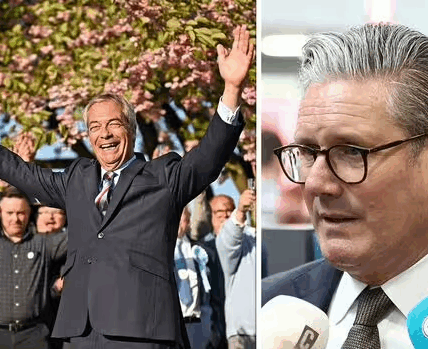Labour is collapsing as the party begins its annual conference in Liverpool

Prime Minister Keir Starmer, left, could be replaced by Andy Burnham (Image: PA)
Nobody expected it to be as bad as this. Thousands of activists, lobbyists and journalists are arriving in Liverpool for Labour’s annual conference, where the topic of conversation will be how long Prime Minister Sir Keir Starmer can last in Number 10, and who will replace him.The flagship announcement of a shiny new rail line, designed to show Labour has a plan to grow the economy, has been postponed.
And the Downing Street team is falling apart, with senior officials quitting and Sir Keir’s right-hand man under growing pressure to resign. The Prime Minister was always going to find this conference challenging. Last year, three months after winning a general election, all he had to do was boast about his victory. This time, Labour needs to demonstrate some achievements. But instead of rising to the challenge, the party has chosen this moment to collapse.
Open warfare has broken out between the Prime Minister and Andy Burnham, the mayor of Greater Manchester, who wants the top job for himself.
Mr Burnham told journalists that Labour MPs “have contacted me throughout the summer” urging him to run for the party leadership. Sir Keir responded by suggesting that Andy Burnham would crash the economy in a similar way to Liz Truss.
It’s remarkable that the mayor is openly angling for Sir Keir’s job, but it’s even more remarkable that the Prime Minister feels the need to respond. It suggests Sir Keir believes there’s a genuine threat to his position – even though Andy Burnham isn’t even an MP, and couldn’t stand for the leadership without first returning to Parliament.
As a result, all eyes will be on Mr Burnham during the party conference, where he will speak at a number of fringe events.
But it’s not just him. Labour MPs contemplating life after Sir Keir are casting around for other potential replacements. It means Home Secretary Shabana Mahmood and Health Secretary Wes Streeting will also be under the spotlight in Liverpool.
To understand how unpopular the Prime Minister is within his own party, consider the deputy leadership contest sparked by the downfall of former Deputy Prime Minister Angela Rayner. Sacked ex-cabinet minister Lucy Powell has vowed to speak out about the Government’s “unforced errors and mistakes” if she gets the job.
In response, rival candidate Bridget Phillipson, the Education Secretary, was forced to deny claims that she’s the choice of the Prime Minister.
That’s how unpopular Sir Keir Starmer is. If Labour activists think he backs you, they’ll vote for somebody else.
For the MPs, it’s personal. One said: “We don’t like him, because we think he doesn’t like us”.
Former Prime Minister Tony Blair understood that he owed his position to Labour colleagues in Parliament. He even struck up a friendship with veteran lefty Dennis Skinner, who was no fan of Mr Blair’s centre-ground politics.
This is not Sir Keir’s approach. The Prime Minister has made more effort in recent weeks to show his face in the Commons tea rooms and bars frequented by Labour colleagues, but it’s too little, too late.
There’s particular anger among the growing number of former front-benchers who were unceremoniously sacked without a word of explanation (which is what happened to Lucy Powell). A kind word would have made all the difference, but that’s not Sir Keir’s style.
Other members of the team have been forced to resign – or just chose to pack their bags and quit.
Scandals led to the resignations of Angela Rayner and former ambassador Peter Mandelson. Conservatives believe they ran successful campaigns to put these two under pressure, and are claiming the scalps.
Sir Keir’s director of political strategy Paul Ovenden, little-known outside Westminster but highly-respected within the bubble, quit two weeks ago.
And Sir Keir has lost two communications chiefs. Ex-journalist James Lyons announced his resignation at the start of September while Steph Driver, another director of communications, stood down on Thursday.
Now, the Tories are hoping to claim the biggest prize of them all. They are focusing attention on Morgan McSweeney, Sir Keir’s chief of staff and former head of think tank Labour Together, which was fined by the Electoral Commission in 2021 for failing to properly declare almost £740,000 of donations.
Mr McSweeney is not famous outside Westminster, and the donations controversy is of little interest to the average voter. But it would be a massive blow to the Prime Minister if the Tories can force Mr McSweeney to resign, because Sir Keir depends on him.
Indeed, it was Labour Together that made Sir Keir who he is today. When Mr McSweeney took over the think tank over in 2017, it became a vehicle for the Labour “moderates” to plan how they would regain control of their party once left-wing leader Jeremy Corbyn was gone.
It was only in 2019, however, that Sir Keir became their chosen candidate.
Labour Together is not some shadowy organisation. It was an attempt by Labour’s most capable politicians, including Ms Mahmood and Housing Secretary Steve Reed, to rescue their party from the clutches of the loony left. But Sir Keir was not in charge, and this is a pattern that continues to this day.
The Prime Minister appears buffeted by events. His flagship conference announcement was due to be Northern Powerhouse Rail, a new line linking Manchester and Liverpool, but delays agreeing the funding mean this has been postponed.
His attempts to slow the rise in the nation’s ballooning benefits bill were sabotaged by Labour MPs. Now he is considering axing the two child benefit cap, which would push spending up further.
When he stood for the party leadership, he declared: “We have to make the case for freedom of movement.” But in response to the rise of Reform and flag-waving marches through the streets of London, the Prime Minister has now said: “Every nation needs to have control over its borders.”
His critics on the Labour benches, and there are many, are convinced Sir Keir never had a plan for running the country.
On Tuesday, the Labour leader will deliver his big speech. This is his chance to prove the doubters wrong, and it’s a safe bet that activists in the conference hall will cheer him to the rafters.
Perhaps he’ll present a vision so compelling that all leadership speculation comes to an end. Tony Blair, one of the great communicators of our age, might have done it.
But Sir Keir is no Tony Blair. He doesn’t inspire people in the same way. And nothing he says can solve the fundamental problems facing his government.
Even if he pulls it out of the bag on Tuesday, it will be a temporary respite at best.

